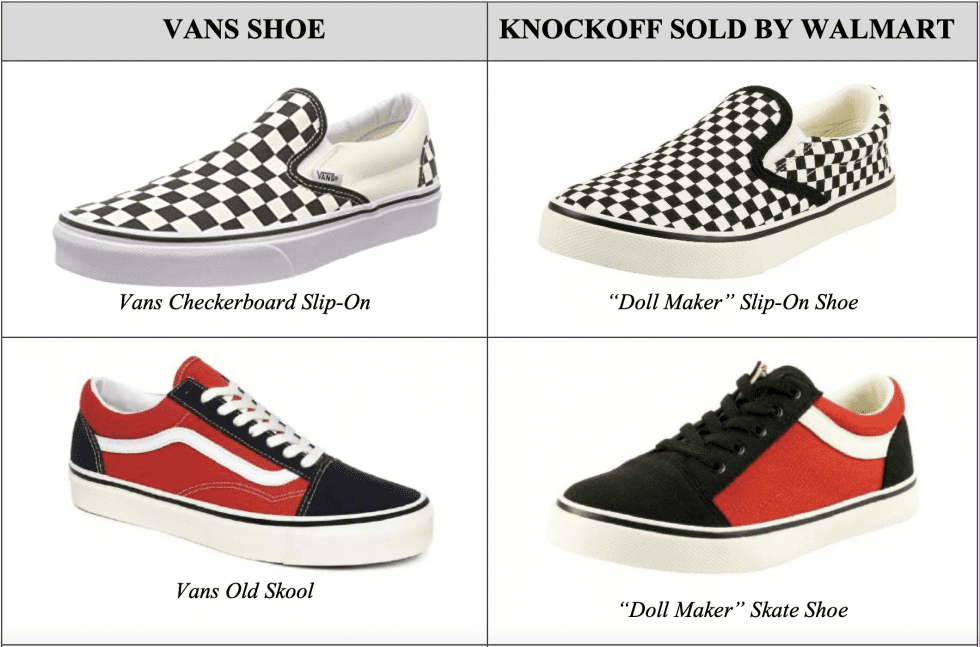Vans and Walmart have reached a settlement in a trademark case that pitted the iconic sneaker-maker against the retail titan over the latter’s alleged “campaign to knock off virtually all of [Vans’] bestselling shoes” and running afoul of its trademark rights in the process. In a joint notice of settlement that they filed on Wednesday, counsels for Vans and its owner VF Corp., Walmart, and Walmart supplier ACI International alerted a U.S. District Court for the Central District of California judge that they have reached settlement and plan to lodge a consented permanent injunction and then a joint motion to dismiss with prejudice shortly thereafter.
The settlement – the terms of which have not been disclosed – comes almost exactly two years after Vans and its parent company VF Corp. filed suit against Walmart, alleging that the Bentonville, Arkansas-based retailer was “shamelessly selling copycat shoes in a direct effort to confuse consumers, unlawfully siphon sales from Vans, and intentionally damage its valuable intellectual property rights.” In particular, Vans claimed that in a brazen attempt to bank on the multi-decade-long appeal of its brand and famous offerings, Walmart – through its own in-house labels, Time and Tru, Wonder Nation, and No Boundaries – was “flood[ing] the market with cheap, low-quality, and confusingly similar shoes” that are little more than “blatant knockoff versions of Vans shoes.”

Vans maintained that Walmart went even further in its alleged attempt to confuse consumers by taking “additional, affirmative steps to try to associate itself and its infringing shoes with Vans.” For instance, Vans argued that Walmart was “intentionally market[ing] all of its infringing shoes as either ‘Skate’ or ‘Retro’ sneakers” in order to “suggest a connection with Vans’ products.” At the same time, Vans pointed to Walmart’s sale of the allegedly infringing footwear alongside what appeared to be authentic Vans sneakers, the latter of which were being offered up by sellers on Walmart’s third-party e-commerce marketplace. Walmart also “enlists endorsers and influencers to promote its products, including its subject infringing shoes, via other websites or social media platforms,” per Vans.
Against that background, Vans argued that that Walmart’s copycat footwear was causing actual confusion among consumers, and set out claims of direct and contributory trademark infringement, unfair competition, and false designation of origin under the Lanham Act and California state law, and sought injunctive relief and monetary damages.
Preliminary Injunction & an Amended Complaint
On the heels of Vans filing suit against Walmart in November 2021 and seeking injunctive relief (which Walmart pushed back against, arguing that Vans’ trademark rights are “weak,” and consumers are unlikely to be confused as to the source of the parties’ offerings, among other things), Judge David Carter sided with Vans. In a March 2022 order, Judge Carter found that Vans had “succeed[ed] in showing that its trademarks and trade dresses” – from its side-stripe logo and the OLD SKOOL shoe trade dress to other “distinctive” footwear designs, such as its Checkerboard Slip-On – are “valid and protectable.” At the same time, the judge held that a “‘reasonably prudent consumer’ in the marketplace is likely to be confused about the origin of [Walmart] goods bearing one of the marks.” As such, the court ordered Walmart and those acting in concert with it to refrain from selling the allegedly infringing footwear in the U.S. for the duration of the litigation.
Not the last word on the matter, Vans argued in an amended complaint in November 2022 that Walmart was continuing to infringe its sneaker-centric trademarks in the U.S. – despite the preliminary injunction put in place by the court. But more than that, the Southern California-headquartered footwear company alleged that Walmart had actually expanded upon its alleged infringement by selling “many of the infringing shoes (as well as additional infringing shoes designed in collaboration with [fellow defendant] ACI International) in other countries, including Canada.”
A Mention of Abitron
And interestingly enough, in connection with a discovery dispute over sales of allegedly infringing footwear by Canada-based ACI International, Vans was one of the first to cite the Supreme Court’s decision in Abitron Austria v. Hetronic Intl., arguing in the case at hand that while the SCOTUS decision “limits and clarifies the test for extraterritorial application of the Lanham Act, it does not preclude discovery into the facts and information necessary to apply that test.” In a memo in opposition to Walmart’s motion seeking modification of the order granting Vans’ motion to compel discovery, Vans asserted in July that while the Supreme Court’s decision in Abitron “limits and clarifies the test for extraterritorial application of the Lanham Act, it does not preclude discovery into the facts and information necessary to apply that test.” In fact, under Abitron, discovery is “necessary” in cases – like this one – where “the evidence indicates that the first sale of the infringing goods occurred domestically, the sales at issue appear to be part of a common scheme controlled by a U.S. company, and the Canadian sales are allegedly diverted sales from the U.S.,” Walmart argued.
Moreover, unlike in Abitron, Vans asserted that the foreign sales at issue here “do not benefit a foreign entity” because Walmart Canada is a wholly owned subsidiary of Walmart, Inc. At a minimum, Vans has maintained that it “is permitted discovery on these allegations that Walmart’s Canadian sales fall within the scope of the Lanham Act,” and “furthermore, even without discovery, the allegations as to Walmart’s conduct already demonstrate that there was use in commerce of the infringing marks in the United States, which satisfies Abitron.”
The court ended up denying Walmart’s motion for reconsideration of its order compelling discovery relating to sales in Canada this summer.
The case is Vans, Inc. et al, v. Walmart, Inc., et al, 8:21-cv-01876 (C.D.Cal.)











